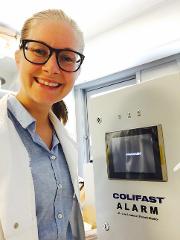Error rendering component
A biotechnologist at Lysaker near Oslo
Ida Maylen Øverleir (28 years, Stokmarknes, Vesterålen, Norway) Master’s degree in marine biotechnology 2014. Position: QAM (Quality Assurance Manager) in Colifast. She is a technician, lab and sales engineer. Colifast sells instruments that measure E. coli and other coliform bacteria in drinking water.
 -In a small company with four employees, we all do everything and the tasks are very varied. It is great to be at a lab, travel in connection with sales and even get involved in hiring new employees.
-In a small company with four employees, we all do everything and the tasks are very varied. It is great to be at a lab, travel in connection with sales and even get involved in hiring new employees.
- It was exciting to start in 2008; it was an almost completely new study with great enthusiasm among the students and staff. I had a great time from day 1. When I worked with both my Bachelor and Master's theses, it was fantastic with supervisors that are easy to contact. They had open doors all the time.
- Since we were relatively few students at NCFS, and at our faculty, we became well acquainted with the vast majority.
- I think microbiology was the most fun course I took, and I wrote my thesis on bacteria. I also liked the topic "Marine biodiversity". We were on interesting visits to companies and we had many good lecturers from the biotechnology industry. I highly recommend you the study in biotechnology at NCFS.
Read more about the studies we offer in our digital brochure
Read more about the studies we offer in our digital brochure.

